Vitamins and minerals are key for good health. They are part of a healthy diet. They help your body work well. They keep you from getting sick. And they help you grow strong.
Eating many different healthy foods is how you get these nutrients. They do a lot of important jobs. From fighting off sickness to helping your brain work, they are a big deal. Knowing how important they are can help you choose foods that are good for you. This way, you can be as healthy as can be.
Importance of Essential Nutrients
Our bodies need many essential nutrients to work well. We can’t make enough of these on our own. So, we must get them through what we eat. These vital nutrients fall into two main types: micronutrients and macronutrients.
Micronutrients and Macronutrients
Small amounts of micronutrients, like vitamins and minerals, are essential. They help our bodies fight off diseases and grow strong. Conversely, macronutrients, such as protein, carbohydrates, and fats, are needed in big amounts. They give us the energy to keep going.
Role in Disease Prevention, Growth, and Good Health
Essential nutrients function together to keep our bodies running well. Having enough micronutrients and macronutrients stops chronic diseases. They also help us grow and stay healthy.
Take essential nutrients like vitamins and minerals, for example. They boost the immune system and make red blood cells. They also keep our bones and teeth strong. Not getting enough can cause problems like anemia.
Then, there are macronutrients like protein, carbohydrates, and fats. They fuel our body’s activities and help fix tissues. Eating a variety of these essential nutrients is how we stay healthy and avoid getting sick.
Vitamins: Vital for Warding Off Disease
Vitamins are tiny nutrients that big health benefits. They boost the immune system and fight cancer. They make our teeth and bones strong.
Vitamins help our skin, brain, and keep our blood healthy. Some of them dissolve in fats, and others in water. Each does special things for us.
Fat-Soluble and Water-Soluble Vitamins
Fat-soluble vitamins are vitamins A, D, E, and K. They live in our body’s fat and liver for later use. But, water-soluble vitamins like C and B-complex? You need to get them often. Our bodies don’t store them.
Benefits of Vitamins A, C, B6, and D
Vitamin A helps us see, grow, and stay healthy. It’s key for keeping our tissues and immune cells strong. Vitamin C fights illness by making more white blood cells.
Vitamin B6 gives us energy and makes red blood cells. Vitamin D helps our immune system, fights swelling, and makes bones strong. Getting enough of these vitamins is good for our health. It can keep us from getting sick.
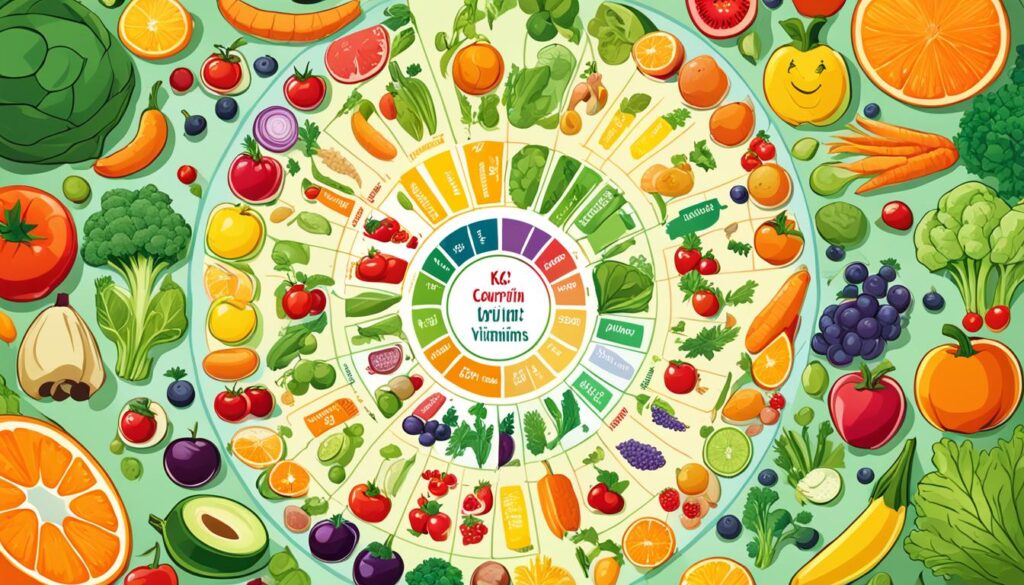
Minerals: Supporting Bodily Functions
Minerals are very important for your health. They help with many body jobs and keep you healthy. There are two types of minerals: major and trace minerals.
Major and Trace Minerals
Big minerals like calcium, phosphorus, and magnesium are needed more. They keep our bones strong and our skin and nails healthy. Little minerals, like iron, zinc, and iodine, have special jobs too.
These smaller minerals help us breathe, fight sickness, and keep our thyroid working right. They all need to be in our diet, but in different amounts.

How much of each mineral we need depends on our age and sex. It’s key to eat lots of different foods so you get all the minerals right. This helps make sure our body works like it should.
Eating enough minerals can keep us from getting sick and help our organs work well. But, having too much or too little can be bad. Talking to a doctor can help you know what your body needs.
Protein: Building Blocks of the Body
Protein is a big part of what your body needs to work right. It’s made of many amino acids. These help your muscles, bones, hair, and skin grow. They also help make things like antibodies and hormones. And sometimes, they can be energy for your body.
Meats, eggs, and beans are great for protein. You also find protein in dairy, fish, and some grains. Your body needs twenty amino acids. But only eight or nine are must-haves, depending on your age.
Babies drink about a quart of milk each day to get all their protein. Groups like the National Research Council set how much protein we need. Kids and teens need more as they grow. Someone who weighs sixty-five pounds might need fifty-nine grams daily. But a pregnant teenager weighing one hundred ten pounds might need 62.5 grams each day.
Protein fixes up and builds your body. It makes your muscles, bones, skin, and blood. Without enough carbs and fats, your body might use protein for energy. So, it’s key to eat a mix of foods to stay well.
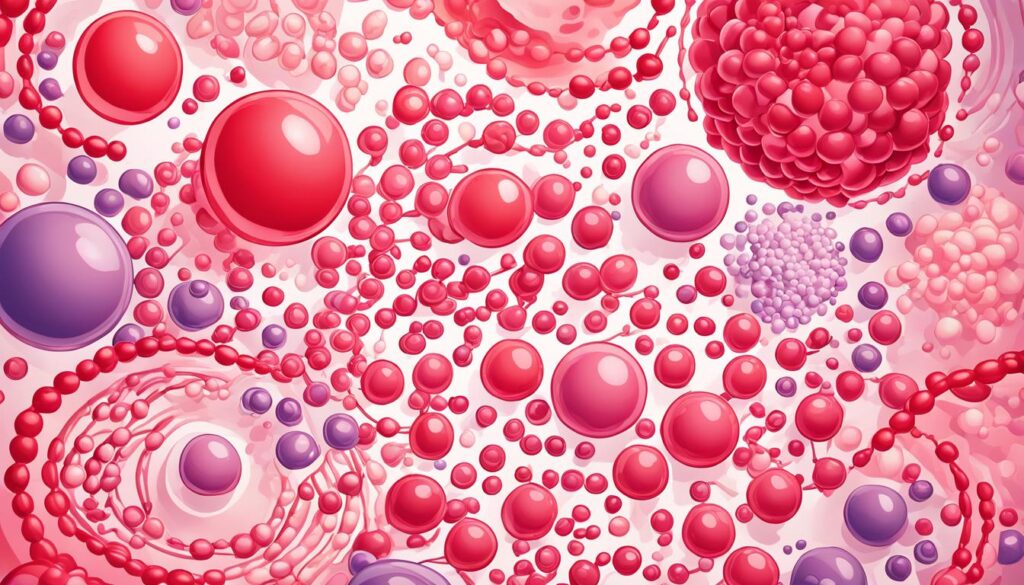
Vitamins and minerals: Micronutrients for Optimal Health
Vitamins and minerals are super important for our health. We just need a little bit of them. They help us fight off sicknesses and grow strong.
Sources of Essential Vitamins and Minerals
Eating a mix of healthy foods is the key to getting enough vitamins and minerals. Try to eat fruits, veggies, whole grains, lean meats, and dairy. These are all rich in the micronutrients our bodies need to work well.
- Leafy greens like spinach and kale are packed with vitamins A, C, and K, as well as minerals like iron and calcium.
- Citrus fruits, such as oranges and grapefruits, are high in vitamin C, which supports immune function and skin health.
- Nuts and seeds are great sources of healthy fats, protein, and minerals like magnesium and zinc.
- Seafood, particularly fatty fish like salmon and tuna, provides omega-3 fatty acids and vitamins D and B12.
- Fortified foods, such as cereal and milk, often contain added vitamins and minerals to boost their nutritional profile.
Eating many of these healthy foods will give your body all the good stuff it needs. A varied diet is your best friend for feeling great. It helps keep you healthy and happy.
Carbohydrates: Fuel for Energy
Carbohydrates are very important for your body’s energy. They do a lot for you, especially your brain and central nervous system. There are two types: simple and complex carbs.
Simple vs. Complex Carbs
Simple carbs are in things like refined sugars and white flour. They make your blood sugar jump fast. Too much isn’t good. It can cause you to gain weight and have health problems.
But, complex carbs are the better choice. You find them in whole grains, fruits, and vegetables. They give you energy for longer, plus fiber, and lots of vitamins. Most people need more fiber than they eat.
For a good diet, the USDA says eat a lot of fruits and vegetables. Fill a quarter with whole grains and another quarter with protein. Be careful with sugar. Most people shouldn’t have more than 25 grams (6 teaspoons) if they were female at birth. For most people born male, it’s 36 grams (9 teaspoons).
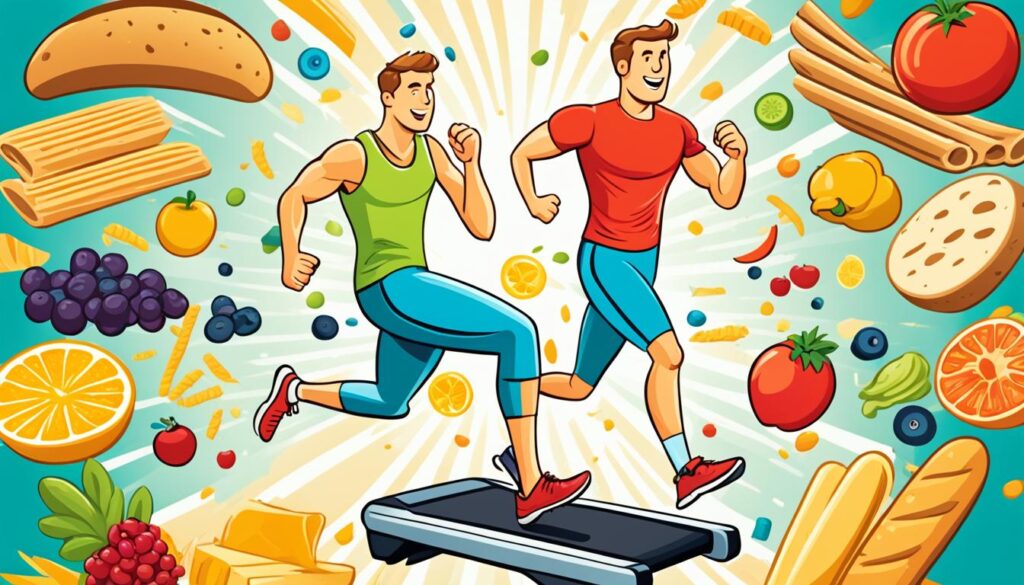
Choosing complex carbs helps you stay healthy. Pick whole foods rich in nutrients like whole grains. They give you lasting energy.
Fats: Essential for Cell Growth and Hormone Production
Fats are very important for your body. They help in many ways. Healthy fats let cells grow, help blood clot, and let us use vitamins better. They also make hormones. Good fats from fish, nuts, seeds, and oils keep your skin, hair, and heart healthy.
But, not all fats are good. Bad fats, like in fast food and snacks, can hurt your heart. They make cholesterol go up, cause inflammation, and make you gain weight.
To stay healthy, eat the right fats. Include these in your meals:
- Unsaturated fats: Olive oil, avocados, nuts, seeds, and fish like salmon.
- Some saturated fats are okay: They’re in dairy, meat, and some oils.
- Avoid trans fats: These are in fried food, many snacks, and margarine.
Picking the right fats helps your health a lot. It supports growth, makes hormones work better, and keeps you in good shape.
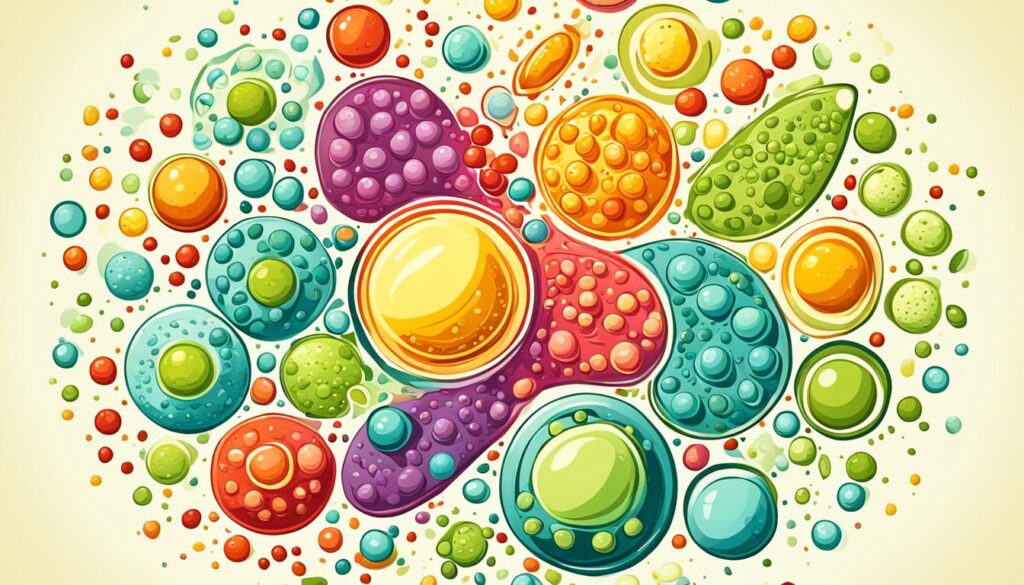
Water: The Most Crucial Nutrient
About 60% of our body weight is water. It is key for many functions. It helps us take in nutrients and keeps our temperature right. Drinking enough water is super important for our health.
Hydration and Bodily Functions
Water does a lot for us. It cleans out bad stuff, keeps our joints working, and helps us digest. It also keeps our blood pressure steady and protects our organs. Being even a little dehydrated can make you feel tired and slow. So, always make sure to sip on some water.
Here’s the deal: experts say you should drink 8 glasses of water every day. Eating fruits and veggies helps, too, because they’re full of water. Keeping your body hydrated is critical. It helps your body work well and keeps you healthy.
- Water makes up around 60% of our body weight.
- It plays a crucial role in flushing out toxins, lubricating joints, and regulating body temperature.
- Dehydration can impair physical and mental performance, so it’s essential to stay hydrated.
- Experts recommend drinking at least eight 8-ounce glasses of water per day.
- Consuming water-rich foods like fruits and vegetables can also contribute to fluid intake.
Balanced Diet for Nutrient Intake
A balanced diet is key for your body to get its needed vitamins and minerals. This helps you stay healthy and work well. Eat lots of whole, unprocessed foods to give your body these essential nutrients.
The Center for Science in the Public Interest tells us diet is crucial. It’s linked to 4 of the top 10 causes of death in the U.S. These include heart disease, cancer, stroke, and type 2 diabetes. To stay healthy, avoid foods with empty calories like cakes and processed meats.
The USDA’s “ChooseMyPlate” says use the plate method. Fill half with fruits and veggies, a little over a quarter with grains, and less than a quarter with protein. Add dairy or a substitute on the side.
Eating this way and focusing on balanced diet and nutrient intake is important for good health. It helps your body get the vitamins, minerals, and macronutrients it needs. This can reduce the chance of getting sick.
Supplements: When Are They Necessary?
A balanced diet usually gives us all the good stuff we need. But, sometimes, taking supplements is a good idea. They help a lot if you can’t eat certain foods or if your body has trouble getting nutrients from food. This happens for people with food allergies, stomach issues, or certain health problems.
Consulting Healthcare Professionals
Thinking about taking supplements? First, talk to a healthcare pro. This could be a doctor or a dietitian. They’ll look at your health and what you eat. Then, they’ll decide if you really need supplements. And, they’ll pick the best ones for you.
They also make sure you take the right amount. This is to keep you safe. They watch out for any bad mix with medicine you might already be taking. And, they make sure the supplements won’t cause you any harm.
- Talk about what you eat and any missing nutrients with your healthcare provider.
- Decide together if supplements can fill the nutrient gaps.
- Get advice on what supplements can work for you, and how much to take.
- Keep checking how well the supplements are working for you. Change them, if needed, with your doctor’s help.
Working with experts helps you pick the right supplements. They make sure it’s good for you. And, they can really help you stay healthy. Always work with a healthcare professional to make your supplement choice. This way, you will be getting all the right nutrients. This means better health and feeling good.
Phytonutrients: Beneficial Compounds in Plants
Plant-based foods have more than vitamins and minerals. They have phytonutrients too. These are good for us. They help fight disease and keep us healthy. For example, antioxidants lower the risk of cancer, heart problems, and memory loss.
Lutein and zeaxanthin can cut the chance of eye problems by 43%. Flavonoids guard against heart issues and cancer. Glucosinolates in veggies like broccoli stop cancer by flushing out toxins.
Eat a mix of colorful fruits, veggies, and whole grains. This will give you many plant compounds. From berries to grapes, these nutrients offer extra health boosts.
- More than 600 carotenoids make fruits and veggies yellow, orange, or red.
- Lycopene in tomatoes helps fight prostate cancer.
- Lutein and zeaxanthin in greens protect your eyes.
- Berries and pomegranates have ellagic acid, good for fighting cancer.
- Catechins in green tea may prevent cancer.
- Hesperidin in citrus fights body inflammation.
- Quercetin in apples and onions helps with asthma, cancer, and heart issues.
- Resveratrol in grapes is good for fighting off disease.
- Glucosinolates in certain veggies may stop cancer growth.
- Soy foods help women by lowering some health risks.
- Flaxseeds and sesame seeds do good things, thanks to lignans.
Eat more plant foods to get these helpful nutrients. They will keep you healthy and happy.
Nutrient Deficiencies and Health Risks
Eating a balanced diet is key to staying healthy. Yet, lots of people don’t get enough important vitamins and minerals. This can lead to many health issues.
Signs and Symptoms of Deficiencies
Not getting enough nutrients can show in many ways. You might feel tired, get sick more often, and have trouble healing from cuts. Some people might not grow as they should. For example, iron is not enough in over 25% of the world.
Iron lack is worse in kids and women who have periods. Iron from plants (non-heme) is not used by the body as easily as from meat (heme).
Lots of people worldwide don’t have enough iodine. This can lead to a big thyroid and mental problems. In the U.S., many lack Vitamin D, especially older people and those with dark skin. Most vegetarians and vegans don’t get enough Vitamin B12. This is also a problem for over 20% of older adults.
Long-lasting lack of nutrients can make chronic illnesses more likely, like problems with bones. A small number of teen girls and older women in the U.S. get the calcium they need. This causes more osteoporosis.
Eating well and fixing any nutrient gaps with help from a doctor is very important. Some places or groups are more at risk for certain lacks. So, it’s good to know what you need and get advice.
Conclusion
Vitamins and minerals are very important for your health. Eating a lot of different foods helps. If needed, supplements can also be good. Always check with a doctor about this.
A, B, C, D, and E vitamins are very important. So are calcium, iron, and zinc. They do a lot for your body. For example, they help energy and keep your bones strong.
Eat various healthy foods to get these nutrients. This will help you feel better and be more active. A good diet and sometimes supplements keep you healthy for a long time.
FAQ
What are the key benefits of essential vitamins and minerals?
Essential vitamins and minerals boost our immune system. They help prevent some cancers. They also make our teeth and bones strong, and keep our skin, brain, and blood healthy.
What is the difference between micronutrients and macronutrients?
Micronutrients, like vitamins and minerals, are needed in small amounts. They are key for our body to work right. Macronutrients, such as protein and fat, are needed more. They give us energy.
What are the different types of vitamins and their functions?
Vitamins work differently based on if they dissolve in fat or water. For example, vitamin A helps with our sight and skin. Vitamin C supports our immune system and makes collagen. The B vitamins and vitamin D also do important jobs.
What are the major and trace minerals, and what are their roles?
We need major minerals like calcium for strong bones. They also help keep water levels right in our bodies. Trace minerals like iron are just as vital. They help transport oxygen and support our immune system.
How does protein support the body’s functions?
Your body needs protein to grow and stay healthy. It’s made of building blocks called amino acids. Protein helps build muscles, hair, and more. It even helps make important body chemicals.
What are the best sources of essential vitamins and minerals?
Eating a mix of healthy foods is the best way to get essential nutrients. Think fruits, veggies, whole grains, and protein. Leafy greens, fruits, nuts, and seafood are especially good.
What are the different types of carbohydrates and their effects on the body?
Carbs can be simple or complex. Simple carbs can make your blood sugar spike. But complex carbs from fruits and veggies give you lasting energy. They also have fiber and vitamins.
What types of fats are essential for health, and which ones should be limited?
Good fats from fish and plants are important for health. They help us grow and absorb vitamins. But we should watch how much saturated and trans fats we eat. Too much is bad for our heart.
Why is water considered the most crucial nutrient?
Water is the main thing our body is made of. It helps us with many important jobs. Drinking enough prevents us from getting tired, sick, or too hot.
When are supplements necessary, and how should they be used?
Usually, a balanced diet is enough. But some people may need supplements, like those with diet problems. Always check with a doctor before taking them. They will help you use them safely.
What are phytonutrients, and how do they benefit health?
Phytonutrients are in plants and good for us. They act as guards against diseases like heart problems and cancer. They have anti-inflammatory powers too.
What are the potential health risks of nutrient deficiencies?
Not getting enough nutrients can cause big health problems. You might feel tired, get sick easily, or not heal well. These issues could lead to more serious health troubles over time.


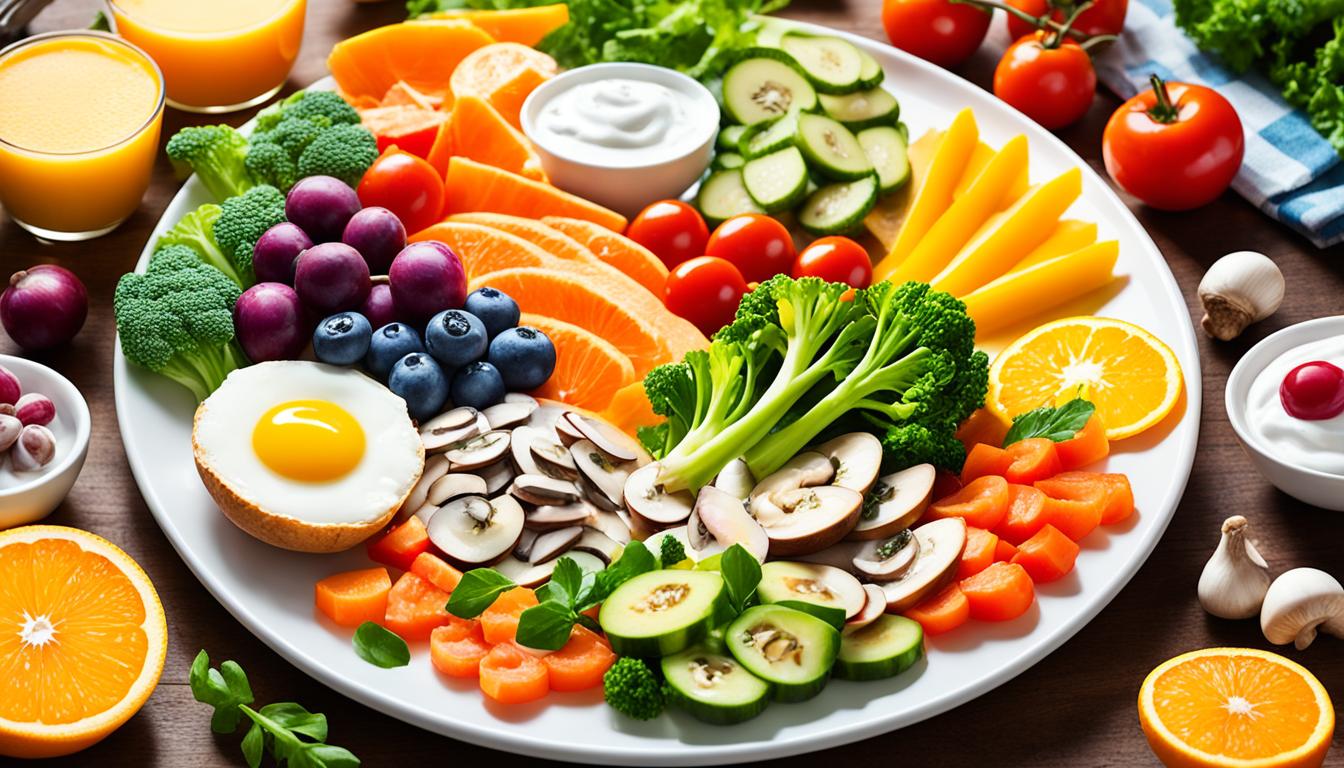










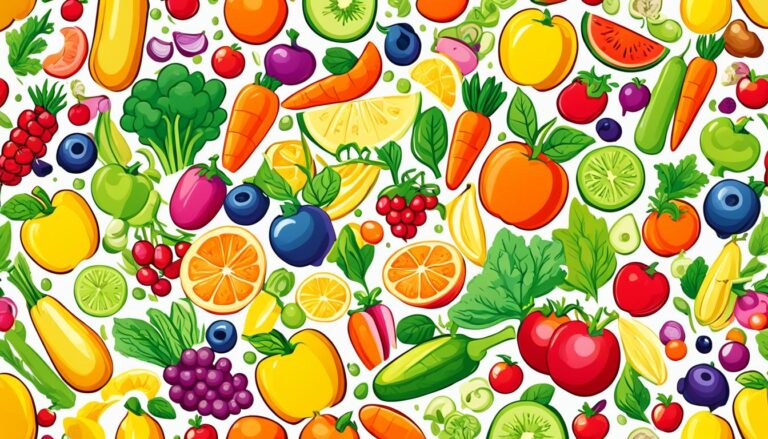


Leave a Comment